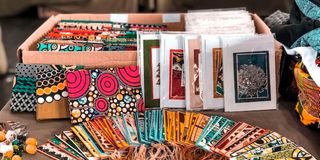Premium
How one young woman is paving the road to economic freedom for the marginalised

Nasreen Ali, founder of AFRIKAPU, a social enterprise empowering marginalised women across Africa with skills, resources, and market access.
What you need to know:
- Nasreen says she is passionate about helping low-income households thrive by providing access to business skills, finances, and markets.
- AFRIKAPU goes beyond market facilitation by addressing exclusion's root causes and designing tailored solutions for artisans in informal sectors.
Growing up in a low-income household in Mombasa, where women faced major barriers to achieving their goals, Nasreen Ali witnessed the resourcefulness and perseverance of the gender in her community, who shouldered huge responsibilities yet were often undervalued.
A personal experience sparked the question: What could our community achieve if womens’ voices were truly valued? This led to the founding of AFRIKAPU, a social enterprise empowering marginalised women across Africa with skills, resources, and market access.
Driven by a commitment to sustainable development, Nasreen is helping communities thrive through social entrepreneurship and meaningful change.
”Becoming the first in my family to pursue higher education, I have dedicated my career to empowering marginalised women and youth. Believing inclusion can change the trajectory of generations,” says the Mandela Washington Fellow, Go Global Africa Champion, Alibaba/UN eFounders Fellow and Tech By Her Fellow.
Nasreen says she is passionate about helping low-income households thrive by providing access to business skills, finances, and markets, strengthening informal economies through these essential resources.
While Mombasa's strong sense of community and solidarity was inspiring, she often saw generosity manifest in short-term relief efforts, such as handouts and food donations.
"I founded AFRIKAPU to introduce real, tangible impact into the global handicraft industry and uplift lives of underrepresented women and girls across Africa’s informal sector, an area that makes up to 80 per cent of Africa’s economy," says Nasreen.
AFRIKAPU goes beyond market facilitation by addressing exclusion's root causes and designing tailored solutions for artisans in informal sectors and climate-affected regions.
The organisation empowers artisans economically, providing tools and resources for leadership and success in a growing eco-friendly market. They produce and sell a range of handcrafted products, including eco-friendly bags, woven baskets, jewellery, stationeries, and home décor items.
Products are crafted using traditional techniques passed down through generations, made from locally sourced, repurposed, and sustainable materials such as sisal, recycled fabrics, beads, and metal. They are sold locally and internationally, with proceeds reinvested into training programmes and community initiatives.
“We provide women with skills training, design support, and access to the necessary tools and resources to craft high-quality products that meet international standards. This approach empowers them to earn a sustainable income and instils a sense of pride in their craftsmanship,” she says.
Nasreen explains that prioritising sustainable materials and ethical production practices ensures that their products contribute to both environmental and social impact goals.

Afrikapu range of products.
She says their approach combines skills training, resource provision, and market access to create sustainable livelihoods. Their programmes are tailored to address the unique challenges faced by different regions, focusing on rural areas, informal economies, and regions heavily impacted by climate change.
“Integrating skills training with resources like raw materials, micro-credit, mentorship, and digital tools provides artisans with access to global markets. We provide platforms that are also created for women to share knowledge and build networks, helping them transition from the informal economy to thriving businesses that export handmade products and compete on the global stage,” she says.
To date, AFRIKAPU has trained over 12,000 women and youth in East Africa’s rural areas, many of whom live in regions most vulnerable to the impacts of climate change.
“We have shipped over 100,000 eco-friendly handmade products to 14 countries and established a formal presence in the UK and USA. One example of our impact is our collaboration with the US Department of State’s Mandela Washington Fellowship Summit, where we supplied handmade products for their summit of 700 global leaders from 54 countries,” she says.
Previously marginalised by systemic barriers such as limited access to capital and markets, these artisans are now earning stable incomes and reinvesting in their communities. Since its inception, AFRIKAPU has faced a range of challenges, from operational hurdles to market-related issues.
“We addressed inconsistent product quality caused by varying artisan skill levels by implementing standardised training programmes and establishing a dedicated team to oversee quality checks and provide feedback throughout production,” says Nasreen.
A challenge AFRIKAPU faced was procuring affordable, sustainable, and high-quality raw materials, especially in remote regions.
To address this, the organisation established partnerships with local suppliers for reliable material sources, while bulk purchasing and centralised distribution helped reduce costs and maintain product consistency.
Protecting unique designs and brand identity from counterfeiting, both locally and internationally, has been a persistent issue. In response, AFRIKAPU is launching a mobile app that allows customers to scan QR codes to verify product authenticity, learn about the artisans, and leave reviews or directly tip artisans into their e-wallet savings accounts.
The mobile app also helps combat counterfeiting by enabling customers to trace artisans and engage with them, promoting transparency and protection.
AFRIKAPU has overcome operational and market challenges by implementing standardised training programmes and continuous oversight to ensure quality, improving product consistency and craftsmanship.
The organisation prioritises locally sourced, sustainable, and recyclable materials in its products, repurposes offcuts, and designs products that maximise material usage. They educate artisans and communities on sustainable practices and promote environmentally responsible production methods.
Nasreen says they guarantee fair returns for artisans through transparent pricing and involve local communities in decision-making to align initiatives with their needs. Open communication with stakeholders maintains transparency and accountability in all operations.





